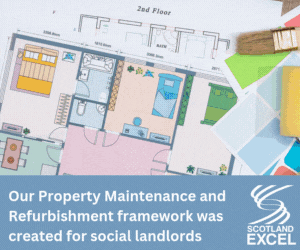Building Briefs – May 21st

Eildon scoops national award for Peebles development
Eildon Housing Association’s new Dunwhinny Gardens development in Peebles was the latest to be recognised at a national awards ceremony winning the ‘Best Development - Medium’ category at the Homes for Scotland Awards last week.
Dunwhinny Gardens is a development of 15 large family homes and one wheelchair bungalow situated to the south of Peebles town centre, with close proximity to the High School. All homes are designed to Housing for Varying Need Standard, are fully adaptable and barrier-free ensuring they can respond to changing requirements.
The development completed in January this year, was delivered in partnership with Architects ASSIST Design Ltd and built by Hart Builders, Edinburgh. The cost of the total investment in the Peebles Strategy Project, which includes the Dunwhinny Gardens project, was funded by a combination of Eildon Housing Association private finance (£5.43m), Scottish Borders Council (£1.55m) and Scottish Government grants (£7.81m).
RLF Scotland delivering over £400m of projects
2015 is shaping up to be a year of growth for RLF Scotland, with over £400 million of cost and project management consultancy projects being delivered with Lingfield Developments, Taylor Clark, BAM Properties, Drum Property Group, West Dunbartonshire Council, Glasgow City Council, Aberdeen City Council and the University of Glasgow.
Key projects include Atlantic Square which is 280,000 sq. ft. of office space in the International Financial Services District in Glasgow, creating one of the largest office developments in the city; £15m new Clydebank Leisure Centre for West Dunbartonshire Council and £61.5m of new care homes for Glasgow City Council.
Housing associations ‘at the forefront’ of energy efficiency technology
Photovoltaics (PV) are the most popular choice of sustainable technology for housing associations, a new report by the NHBC Foundation has found, with around three quarters saying they would use PV products again in the future.
The social housing sector has been at the forefront of the adoption of different types of energy efficiency technologies and water-saving features as it has generally been building new homes to higher levels of the Code for Sustainable homes. The NHBC Foundation primary research report Sustainable technologies – the experience of Housing Associations identifies technologies that have worked well, those that have given rise to concerns and the nature of those concerns.
The research found that almost two thirds of housing associations surveyed said they had experience of at least one type of sustainable technology. Based on their experiences, the most popular option for use again in the future is PV (75 per cent), and between 50 and 60 per cent of housing associations say that they would expect to use MVHR (mechanical ventilation and heat recovery) and solar thermal hot water in the future.
Water-saving technologies have also been widely used with low-flush toilets and low-flow taps and showers becoming standard in new homes. Three quarters of housing associations expect to use these again in future. However, ground source heat pumps, exhaust air heat pumps, greywater recycling and rainwater harvesting delivered the lowest levels of satisfaction with at least one third saying they would seek to avoid these products.
River Ness Flood Scheme nears completion
The completion of Phase One of the River Ness Flood Scheme, at Bank Street is to open fully on 29 May, with Huntly Street opening the following week on 5 June.
Work remaining to be done involves the installation of some special coping stones which are due for delivery on 25 May. The contractors, Morgan Sindall, have been tasked to see if there are any mechanisms available to allow completion to be brought forward.
Phase 2 of the flood scheme which covers Friars Bridge to the Harbour is scheduled for completion in July.
Ruthven Bridge to close in July
The Highland Council has announced the Ruthven Bridge will be closed at the end of July.
The closure will last for approximately six weeks allowing work to be undertaken on the £1 million project to replace the bridge.
Proposals for the bridgeworks require removing the existing bridge superstructure and installing a replacement.
The B970 road will be closed during the development work.
During the closure, a public road diversion for light vehicles will be in place via the River Spey crossing at Kincraig. Heavy vehicles are already diverting via Aviemore.
A temporary route for vehicles was previously proposed, however the route was likely to cost over £70,000.
A814 carriageway roadworks underway
Argyll and Bute Council has announced roadworks are taking place on a carriageway in the region.
Resurfacing works are being carried out on the A814 Craigendoran from Station Road to Hermitage Academy, Helensburgh.
The work will be undertaken from 9.15am to 3.30pm, lasting two weeks.
Public invited to take part in Orkney flood consultation
Orkney Council is inviting the public to take part in a flood risk management consultation for the county.
The Scottish Environment Protection Agency (SEPA) along with 14 local plan districts are jointly consulting on the future direction and delivery of flood risk management across the country.
Potential measures to address flooding includes routine inspection and maintenance of flood defences along with monitoring applications for developments in flood zones.
The consultation is available online until 2 June.
Drop in event announced for Cupar conservation occupiers
A drop in event has been announced for property owners and occupiers within the Cupar Conservation Area.
The exhibition will promote the opportunities available from the new building repair grant scheme.
The initiative is funded by Historic Scotland and the Heritage Lottery Fund through the Cupar Conservation Area Regeneration Scheme (CARS) and Townscape Heritage Initiative (THI) programme.
Approximately £560,000 is available for properties within a designated space at the heart of the Cupar Conservation Area, which includes St Catherine Street and part of Bonnygate and Crossgate.
Grants can support repairs to historic buildings using traditional materials and skills, as well as improvements to historic shop fronts.
The event will take place at County Buildings in Cupar between 3pm-7pm on 27 May.















